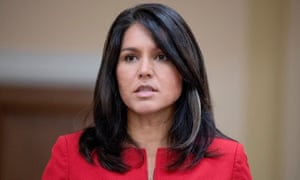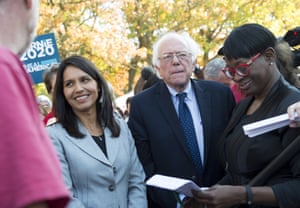Friday, August 10, 2018
Ideological purity and the left....socialism is where your job depends on your opinions; capitalism is where your job depends on your performance.
Tulsi Gabbard, an Iraq War veteran who made history in 2012 as the first Hindu elected to the US Congress, has cemented herself as a rising star within the Democratic party.
She has the support of Bernie Sanders, the de facto leader of the progressive movement, and boasts of endorsements from a string of liberal-friendly groups. The environment-focused Sierra Club and League of Conservation Voters, labor unions such as the AFL-CIO, Planned Parenthood and National Nurses United have all given Gabbard, a three-term congresswoman, their blessing as she seeks re-election in the November midterm elections.
But Gabbard’s stated progressive bona fides have been called into question by her opponents, who are waging an ambitious challenge from the left in the hopes of pulling off an upset in Saturday’s Hawaii congressional primary.
Although their prospects are grim, Gabbard’s critics say her views on foreign policy and tolerance for dictators such as Bashar al-Assad deserve another look.
As one of the few Democrats to meet with Donald Trump following his election, Gabbard’s unorthodox positioning has drawn scrutiny at a time when progressives have rallied their midterm messaging around opposition to the president. Her highly controversial visit last year to Syria, where she met with Assad, also raised eyebrows both nationally and at home.
“The wake up call, for most of us, came when Gabbard met with Trump soon after his inauguration and then with Assad, instead of marching on DC with us and the rest of the Hawaii’s congressional delegation during the Women’s March in protest of what has become an unprecedented abolition of human and civil rights in America,” said Sherry Alu Campagna, an environmental scientist who is among Gabbard’s most well-known primary challengers.
“The incumbent clearly has an agenda that does not involve her constituents and we are waking up to the fact that our needs are taking a back seat to her ambitions.”
Gabbard has emerged in recent years as a paradox of the progressive movement. When she was first elected to Congress, MSNBC host Rachel Maddow declared at the time: “She is on the fast track to being very famous.”
Indeed, Gabbard swiftly cemented herself as one to watch; she co-founded the Congressional Future Caucus, bringing together the youngest members of Congress with an eye on addressing issues facing millennials, and landed assignments on the House committees on foreign affairs and armed services.
In the 2016 election cycle, Gabbard seized on an opportunity to further her rise to national prominence. At the height of the hotly contested Democratic presidential primary, Gabbard resigned from her position as the vice-chair of the Democratic National Committee and endorsed the insurgent candidate Bernie Sanders. Gabbard’s move came as Democrats struggled to rein in an intra-party feud stemming from allegations that the DNC was working behind the scenes to influence the nominating contest in Hillary Clinton’s favor.
Two years later, Gabbard’s support for Sanders has paid dividends. Her re-election bid drew the endorsement of Our Revolution, a grassroots political organization launched by veterans of Sanders’ campaign. The group cited Gabbard’s record on issues ranging from climate change to workers’ rights and women’s health as the basis of their support, insisting she has proven herself as reliably progressive.
But Gabbard’s critics argue her views on foreign policy, immigration and gun laws warrant more scrutiny and undermine the agenda upon which Democrats are campaigning across the country.
“Nationally, people thought, she checks all the boxes, this is great,” said Shay Chan Hodges, an activist who unsuccessfully challenged Gabbard in 2016. “But I think people have now started looking more closely at her record and what she’s saying.”
Gabbard’s opponents have cited her refusal to debate them as evidence of her reticence to publicly defend her record on certain hot-button issues. Gabbard was unchallenged in 2014 and has not taken part in a primary debate since the year she was elected.
Hawaii News Now attempted to convene a debate between Campagna and Gabbard to no avail; the congresswoman’s campaign defended the move by stating: “She continues to communicate directly with voters across the district.”
It is not uncommon for dominant incumbents to generally avoid debates. But Gabbard’s decision to decline to participate in such a forum has exposed her to charges of hypocrisy, since she forcefully advocated for adding more debates between Clinton and Sanders in 2016 in a high-profile split from other DNC leaders.
“While she may think this is a strategic move to prevent the success of her challengers, what it really does is silence the discussion of important issues that face Hawaii’s rural constituents,” said Campagna. “It also prevents any opportunities for voters to hold Tulsi accountable.”
In 2015, Gabbard was among a minority of Democrats who voted for additional restrictions on refugees entering the US from Syria and Iraq. She has also previously expressed “skepticism” that the Assad regime is behind chemical weapons attacks in Syria, and aligned herself with nationalist figures such as Narendra Modi of India.
Breaking with most Democrats, Gabbard has embraced the use of the phrase “radical Islam” – a phrase which to many Muslims has evolved into a dog whistle on the right intended to indict the entire Islamic faith. Gabbard has said she is mindful that most Muslims are not extremists, but joined Republicans in criticizing Clinton and Barack Obama for not employing the phrase, stating: “It’s important that you identify your enemy”.
Although a majority of Democratic voters in Gabbard’s district and neighboring areas said she was obligated to debate her rivals, the snub has not appeared to have had much palpable effect on her prospects.
Colin Moore, an associate professor of political science at the University of Hawaii, said Gabbard’s continued popularity was undeniable. But whereas he predicted Gabbard would sail to another term in Congress, Moore said she has yet to truly be tested nationally — where her ambitions may, in fact, be.
“The Hawaii congressional delegation has often thought of itself as a team whose primary goal is to go to Washington and bring federal dollars back to Hawaii,” Moore said. “The way they have done that is work with everyone, keep a very low profile, be around for a very long time and rise in seniority.”
“Tulsi has really bucked that trend … she is this national political figure, who appears on CNN and other national media outlets quite frequently, talking about issues that don’t directly affect Hawaii.”
“That has led to a sense that she’s neglecting her responsibilities and that she isn’t really serving her constituents well,” he added.
Gabbard declined an interview for this story and did not responded to questions around her opponents’ criticisms.
It was revealed in June that Gabbard is writing a book to be published by a literary agency that boasts of representing presidential contenders. Last October, she traveled on a multi-day swing through the caucus state of Iowa, urging party unity while fueling speculation of higher ambitions.
Although her opponents are far from likely to pull off an upset this cycle, the brimming frustration that Gabbard is taking her position for granted – and skepticism around her progressive image – could foreshadow the challenges that lie ahead.
Labels:
congressional idiots,
Democrats,
Socialism
Subscribe to:
Post Comments (Atom)








No comments:
Post a Comment